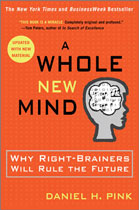In “A Whole New Mind”, Daniel Pink explains that business has been dominated since World War II by “left-brain thinkers”. These individual’s thought process focuses on logical or sequential thinking. Management consultant Peter Drucker coined the term “knowledge workers” to describe lawyers, accountants, software developers, engineers and doctors who have been the architects of the Information Age.
 To over simplify brain structure, the left hemisphere handles what is said; the right hemisphere focuses on how it is said – the nonverbal, often emotional cues delivered through facial expression and voice tone. Pink states that there is an ongoing transition from left-brain dominance to right brain or whole brain thinking. He gives three causes: Abundance, Asia, and Automation.
To over simplify brain structure, the left hemisphere handles what is said; the right hemisphere focuses on how it is said – the nonverbal, often emotional cues delivered through facial expression and voice tone. Pink states that there is an ongoing transition from left-brain dominance to right brain or whole brain thinking. He gives three causes: Abundance, Asia, and Automation.
Abundance- These two examples prove the depth (some would say sickness!) of “abundance” in our consumer society:
- Self-storage – a business devoted to providing people with a place to stash their ‘abundance” (extra stuff) is a 17 billion dollar annual industry.
- The United States spends more on trash bags than ninety other countries spend on everything!
Asia – In the 60’s and 70’s many factory jobs were lost to Mexico and other nations. However, since then the loss has been “white collar” jobs such as software development, accounting, legal and even the interpretation of x-rays. These jobs have been going to India, Pakistan, China and other countries where the same job is done for a fraction of the costs in this country.
Automation – This means much more than high-speed tufting machines making carpet at unbelievable rates. Computerization is the primary driver in businesses today, large or small. Any job that depends on routines – that can be reduced to a set of rules, or broken down into a set of repeatable steps – is at risk. A good example would be accountants. Turbo Tax and Quick Books have made their skills less necessary.
Drawing on research from around the world, Pink reveals the six essential aptitudes—Design, Story, Symphony , Empathy, Play and Meaning—on which professional success and personal fulfillment depend. Study these six and see how they interact with small businesses such as cleaning and restoration companies and of course, your company.
Design – Today it is no longer enough to create a product, service or experience that is merely functional. Because of the abundance of choices available consumers want more for their money. Products are easy to differentiate. We discover in Jon-Don’s Strategies for Success seminar that any service is more of a feeling. In the service business creating the experience and adding emotional tie-ins are critical. For example, in the customer’s mind just getting the carpets “clean” is assumed and will not set you apart. So how are you going to set your service apart? Value Added Service as taught at SFS is a great beginning.
Note: Steve Toburen explains in SFS that there are only two things people want from any service. A) Solutions to their problems AND B) good feelings! Consistently provide both and you will retire wealthy from the cleaning industry!
History – Does your company have a story to tell? Don’t just throw more facts and figures at an already overwhelmed consumer. Instead, tell the story of how you saved the day for the Jackson family when you were able to remove that horrible spot or pet odor. Or tell the story of how you worked your way through college to attain that MBA degree only to realize after graduation what you really love is making customers happy by beautifying their home. People are like kids. They love stories, not just a dry recitation of facts.
Symphony – As a small business owner you are like a conductor of a symphony. You need to take disparate ideas and people and bring them together to create “beautiful experiences” for your customer. (Steve calls this the “Home Front Stage Play” in Strategies for Success.) So you must be able to think holistically.
Empathy – This one is critical for restorers. Empathy is the ability to imagine yourself in your customer’s very wet shoes as she watches her valuables and irreplaceable items float by. Then you must walk the delicate line between the home owner and the adjuster! These are skills that even the most advanced computer cannot duplicate. This is the skill your technicians need when they talk to customers. People’s emotions are rarely put into words; far more often they are expressed through other cues. It probably comes as no surprise that women are far superior in empathetic skills. In addition to technical classes all of your people should take classes in communication skills and dealing with conflict. Jon-Don’s Value Added Service for Technicians- Restoration seminar is essential for any restoration company. (Even better, Jon-Don will bring the VAST seminar on-site to your company.)
Play – This doesn’t mean you must spend your life on the golf course. (Although studies have proven that playing video games can improve visual perception by 30%!) As you might imagine, humor comes from the right side of your brain. Humor reduces hostility, deflects criticism, relieves tension, improves morale and helps communicate difficult messages. The most effective managers use humor twice as often as average managers. This doesn’t mean you have to be a comedian, just be an observer of the foibles of everyday life. Humor comes from inside. Children laugh hundreds of times a day where adults are pressed to laugh a dozen times a day. Lighten up!
Meaning – What gives you happiness? According to Martin Seligman, author of Learned Optimism, things that contribute to happiness are: “engaging in satisfying work, being married and having a rich social network”. Also important are gratitude, forgiveness and optimism. What doesn’t seem to create happiness are making more money, getting lots of education, or living in a pleasant climate. (Of course, this is easy to say for a man who doesn’t have to spend winters in Chicago!) Remember that life is too short to spend it doing something you don’t like.
So what does all this brain stuff really mean to a person pushing a scrub wand for eight hours a day? A study of employment data over the last decade has shown that the largest gains have been in jobs that require people skills and emotional intelligence as well as imagination and creativity. In other words, as a carpet cleaner or restoration contractor you already are in a business that has a great future. Your job can never be done by a computer, a robot or outsourced to Bangladesh!
The six senses discussed above are fundamental human attributes. They reside in all of us and only need to be nurtured. Pink assists in that by creating a portfolio at the end of each chapter which provides tools, tips, books, websites and hands-on exercises to enhance your six senses. This doesn’t mean that logic and left-brain thinking is going out the window. It just means that blue-sky people will finally be given equal status. Finally emotional intelligence (EQ) will take its place alongside those smug people who had killer SAT scores in high school!
